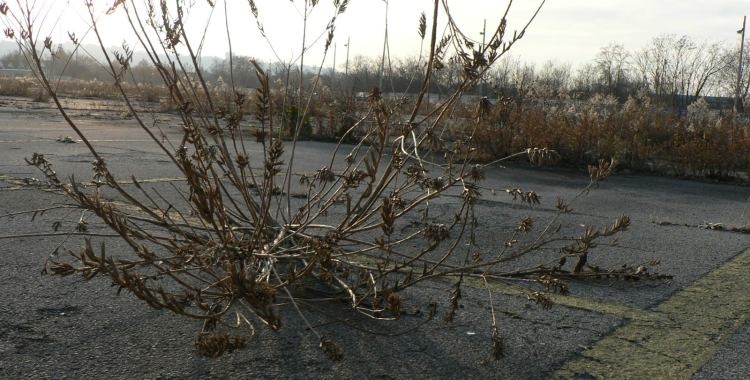Knowing the Land is Resistance (KLR) has been running nature exploration workshops in southwestern Ontario for three years, demonstrating to participants how to (re)connect with the natural world around them, in any setting. I attended a very different KLR workshop in Waterloo in March, at which they presented five starting points for developing an anarchist ecology, which are outlined in an excerpt below.
Knowing the Land is Resistance (KLR) has been running nature exploration workshops in southwestern Ontario for three years, demonstrating to participants how to (re)connect with the natural world around them, in any setting. I attended a very different KLR workshop in Waterloo in March, at which they presented five starting points for developing an anarchist ecology, which are outlined in an excerpt below.
The theory they propose embodies – and shows how to foster in anyone – the kind of whole ecosystems thinking that needs to be embraced if we’re to stave off climate change and eventual ecological collapse. The Experimental Lakes Area is rare example of whole ecosystem thinking in action – and the Canadian government shut it down (it was recently announced that the ELA will remain open until the end of 2013, thanks to the province of Ontario, but a long-term funding solution still needs to be found).
The workshop got me thinking about some of the limitations of greenbelts (the subject of our last issue). If we only see nature as existing “somewhere else”, outside of the city, then accessing “nature” becomes a privileged experience. KLR proposes an awareness of urban ecology to combat this. Equally important is the acknowledgement that much of our ecological knowledge comes from Indigenous peoples. KLR argues that, if we benefit from acquiring, utilizing and sharing our knowledge of the land, we must give back by recognizing where that knowledge originates and by centering resistance (hence the name) to ongoing colonialism.
Knowing the Land is Resistance was happy to let us share the introduction to Towards an Anarchist Ecology with you. The rest of the essay is being posted on their website in stages. Enjoy!
Towards An Anarchist Ecology: Introduction
We are settlers on this land, raised in cities, rootless and alienated from the ecosystems we can’t help but be part of. But we want to unlearn what we have been taught by the dominant culture, and in the process, we want to re-learn joy, connection and wonder, while embracing grief and loss in order to heal. We want to decolonize, and to do this, we need to build a new kind of relationship with the land. We want to take steps towards an anarchist ecology, towards a knowledge of the land that is anti-colonial and anti-authoritarian.
This introduction is the beginning of a seven-part series offering some ideas of what an anarchist ecology might be. The other parts will be released throughout April and May, this exciting springtime month of high water, busy birds, swelling buds, open windows and wanderlust. We hope these words will compliment the re-birth and inspiration that this season brings you.
Towards an Anarchist Ecology – it’s a provocative phrase, but what does it mean? Let’s start by looking at each of these terms separately before we consider their meaning together.
Ecology is the study of interconnectedness in natural communities. It’s the way different plants, creatures and forces interact with each other to create the conditions for the whole ecosystem. It is also the way they collaborate to bring about succession, the process by which one ecosystem gives way towards another. Succession is also a process of resiliency, towards more diversity and greater health. Theoretically, succession eventually reaches a climax community, which is a rich, stable ecosystem that self-perpetuates. However, climax ecosystems are in reality interconnected with systems of healthy disturbances like fire and wind, as well as impacted by human destruction. And so succession is constantly ongoing and all the various stages of succession are present in wild communities.
We use the word anarchist in the sense of anti-authoritarian, emphasizing the need to challenge the authoritarian tendencies of mainstream ecology, or, as we call it, dominator ecology. The clear rejection of the state’s authority by anarchists is a vital step in the process of decolonization. As Mel Bazil, of the Gixsan and Wet’su’weten nations said in a talk at the Victoria Anarchist Bookfair, “Anarchists have stepped away from colonial constructs by asserting that no one is more qualified to live your own life than you.”
And the word ‘towards’ – this is perhaps the most important part of our title. We are not offering clear answers here, and we aren’t speaking authoritatively. We are hoping simply to offer some hints and starting points for building an anti-authoritarian, anti-colonial process of knowing the land. There are lots of folks around who have more experience in this than we do, especially in Indigenous communities. The ideas we will outline here are based on the efforts of our collective, in the three years of its existence, to build and share such knowledge. We draw from our experience of having offered more than thirty workshops in communities throughout the region and from the different perspectives and ways of knowing we encountered in our travels.
‘Towards’ also reminds us that both decolonization and connecting with the land are ongoing processes. Just as there will never be a point when we can stop unlearning and struggling against colonial constructs, there will never be a time when the living earth will stop filling us with wonder, turning all that we know into a thousand more questions. We want to let go off this idea of arriving at some point at which we no longer need to strive.
In this series, we will offer five starting points for cultivating an anarchist ecology, and we will also take some time to define dominator ecology. Here’s a short summary of the six articles to follow:
Dominator Ecology
Mainstream ecology is deeply colonial and frequently acts at the service of political institutions and corporations. We want to dismiss the practice of dominator ecology, how and why it does what it does, without dismissing many of its insights and findings. We also want to speak honestly about the role dominator ecology plays in the destruction of the wild and ongoing colonization. Read parts one and two.
Rooted in Relationships
When we talk about knowing the land, we are talking about building a relationship with the land. This involves radical interconnectivity, engagement, reading the land’s history and cultivating joy and humility. Read Rooted in Relationships.
Deep Listening
Like in any good relationship, we will get to know the land using deep listening, which means reconnecting with our senses, being open to tragic realities and resisting the easy answers of appropriating spiritual practices.
Spending time with the land, staying in our senses and asking questions might sound like simple things, but in mainstream society we’re conditioned to deaden our senses, and often the environments we live in often don’t exactly inspire us to pay close attention. When we do begin listening to the land, we’re likely to notice some really painful realities. Read Deep Listening.
Urban Ecology
The wild is everywhere, and land in cities is just as important to the health of our watersheds as are conservation areas. We will also explore how the health of human communities and the health of the land are linked by the power dynamics that harm each of them, such as gentrification, industrialism and industrial collapse. Read Urban Ecology.
Re-enchanting
How can we make our passions contagious? How can we spread a decolonizing practice of knowing the land? What issues of access to wild spaces exist, and how can we break those barriers?
Unexpertness
The idea of expertise is one of the big ways we’re kept from connecting with the land and kept alienated from our own experience, as if we’re not qualified to notice what is around us. As well, the pressure of ‘being an expert’ can stifle our own growth by making it hard to ask questions and be vulnerable. How can we cultivate non-hierarchical knowledge?
You can read the full essay on the KLR website. They will be posting the last three pieces throughout May.
Laura is a past A\J managing editor. She has an MA in Communication Studies from Wilfrid Laurier University, is an organizing aficionado, lackadaisical gardener, and former musical theatre producer. @inhabitings













